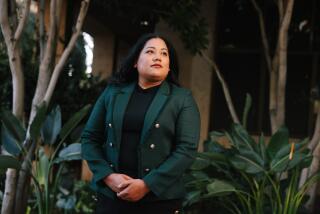Going from bit part to a starring role
- Share via
Only two months ago, when 135 Californians converged on county registrars’ offices waving nomination signatures and $3,500 checks, it seemed as though these people were creating a new kind of fragmented, noisy citizen politics.
The campaign, of course, quickly crystallized into a much smaller field. Sixty days after their raucous start, most of the candidates whose names graced the recall ballot will return home today not much better known than they started.
But for a select few whose electoral exploits were captured by roving independent documentary film crews covering the grass-roots side of the recall, election day might have been only minute 14 of their allotted 15 minutes of fame. At least three full-time crews, plus an assortment of entertainment and foreign news media, spent time following the unknowns. One two-person team flew out from New York to follow a core group of candidates who initially included porn star Mary Carey, backwoods marijuana farmer B E Smith and Georgy Russell, an earnest 26-year-old Democrat and computer programmer from Mountain View whose “Georgy for Governor” thong underwear attracted early notoriety.
Another crew trailed an assortment of candidates, including perennial American Independent Party representative Diane Beall Templin, who two-stepped her way from rally to rally wearing a stars-and-stripes kerchief. Kathleen and Lori Carr, sisters from West Los Angeles, followed their neighbor James Vandeventer Jr., an openly gay Republican candidate who drove around on the campaign trail in his 1938 Buick.
“We started out trying to find the most flamboyant people, the colorful characters,” said Robbie Stauder, who started shooting footage of Carey and Russell just before Labor Day weekend. “We were coming from New York, so we were looking for the fun in the whole thing.”
But at a Labor Day weekend gathering of 40 lesser-known candidates in Alameda, Stauder and his shooting partner, Jayson Haedrich, found a group of otherwise ordinary people whose most extraordinary quality was an unshakeable, quixotic belief that they had as much of a shot at influencing the recall race as any of the marquee names.
Stauder and Haedrich quickly latched on to Mike McCarthy, a used-car dealer and small-business advocate from San Luis Obispo who developed a “Rocky”-esque alter ego and donned red, white and blue boxing silks for his appearances, including one on the “The Tonight Show,” on which he appeared in late September along with 89 of his colleagues.
They also trailed Cheryl Bly-Chester, an environmental engineer and a divorced mother of three from Sacramento who cooked up a variety of complicated schemes for addressing the state’s budget woes. And they recorded Bill Wyatt, a novelty-store owner from Los Feliz who appeared on the ballot as William Tsangares, but legally changed his name halfway through the campaign, as he got thrown off “The Tonight Show” set protesting unequal air time and got a ticket from police for sitting in the path of Schwarzenegger’s California Comeback Express as it rolled out of a rally in Arcadia on Friday.
“These people changed as they went through the political process,” Stauder said. “It became about them, and the funny moments they had, instead of mocking the whole experience.”
Stauder’s documentary is being produced by director Nigel Noble, who said he hopes the project will be finished by Christmas. He said he did not yet know whether it would stand as a feature-length theatrical release or be tailored for television broadcast.
The other two crews said they were not sure in what form their projects would be shown.
Noble, who won an Oscar in the 1980s for his documentary “Close Harmony,” got his start in political documentaries working on “The Making of the President” documentaries in 1968 and 1972 with David Wolper. He said he hoped these documentaries could shed similar light on the recall election.
“Our job then was to back into elevators with people, to shoot what the media was not allowed to shoot, to get into the back rooms,” Noble said. “These people now have no chance of being elected, they have no back rooms, but they have something to say about how the country should be governed, and that’s important.”
More to Read
Get the L.A. Times Politics newsletter
Deeply reported insights into legislation, politics and policy from Sacramento, Washington and beyond. In your inbox twice per week.
You may occasionally receive promotional content from the Los Angeles Times.










